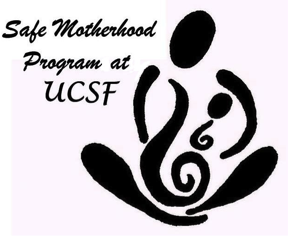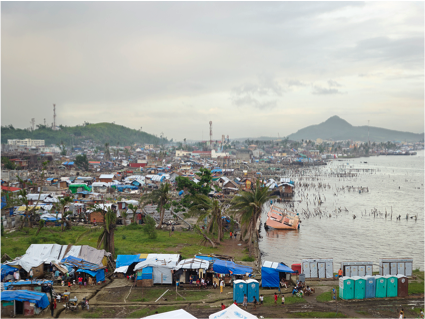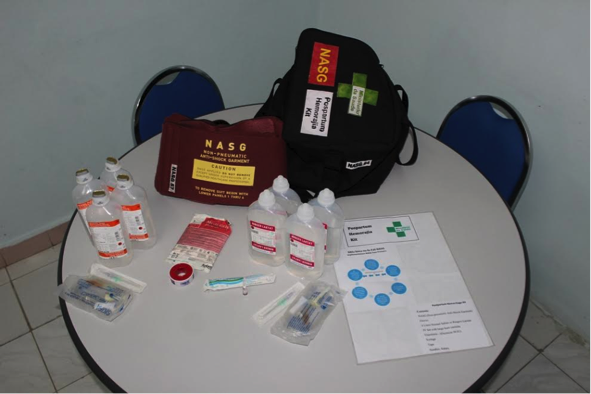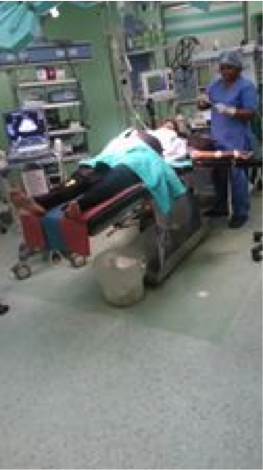
Dec 14, 2014
Dear Friends of Safe Motherhood:
Greetings to all of you, who have remained friends of Safe Motherhood through the past decade. This is an update of some of the activities that UCSF Safe Motherhood Program and the LifeWrap have had in 2014. I have tried to focus this year’s letter on our partners in the many countries where we work. Although you may not know them by name, these are the global champions who are carrying on the work now that NASGs have been clinically demonstrated to save mother’s lives.
After our clinical trials were completed and the results were published, we enjoyed the success of having the World Health Organization (WHO) and the International Federation of Gynecologists and Obstetricians (FIGO) adding the NASG to the global postpartum hemorrhage (PPH)guidelines and we have been invited to contribute our expertise to expanding implementation projects in new sites. Thanks to Metin Gulmezoglu of WHO and Andre LaLonde,Sabaratnam Arulkumaran, Will Stones, and Claudia Hansen of FIGO.
NASGs are now being used in over 20 countries, in many countries “at scale,” that is, in the majority of districts/states.
 PostDisaster: Haiti and the Philippines.
PostDisaster: Haiti and the Philippines.
Safe Motherhood Program donated NASGs to midwife Robin Lim (CNN Hero) and her associates in Tacloban, the Philippine city most devastated by Hurricane Haiyan.
Robin wrote to me:
“In the Philippine Disaster zone the shock garments have saved the lives of 3 women since the Bumi Sehat team have adopted the Safe Motherhood Camp. I told the midwives about the existence of Shock Garments. What followed was a long excited discussion. One midwife said, “You would have to be very careful when taking it off, you know, has to be from the bottom up toward the heart, and slowly.” I nearly cried, this is the kind of bright Midwife, who goes on to save uncounted lives, because she has common sense, and can think thoroughly and wisely.
In addition, we gave training materials to and conducted trainings for Médecins Sans Frontières (MSF or Doctors without Borders) and the Canadian Red Cross. MSF plans to implement NASGs in Western African countries affected by Ebola. Much gratitude to my colleague at MSF, Barcelona, Olivia Hill. Thanks to Dr. Sohel Solani, who worked for two years to get the Red Cross to accept NASGs, the Red Cross will implement them in South Sudan, along with projects in Haiti and the Democratic Republic of Congo. Shout out to Dr. Lisa Thomas of WHO, she has worked tirelessly to keep the NASG on the front burner of humanitarian organizations. Thanks to her efforts, we have now been invited to present to the International Commission of the Red Cross in Geneva.
New Projects:
Other NASG-using countries have expanded their use of the NASGs and new countries have added NASG programs.
I just returned from a 6-week trip around the world, first stopping in Hong Kong to work with the new manufacturer of NASGs, BlueFuzion Group, who has worked to manufacture a high quality, low cost garment for around $60, then to Timor Leste and Tanzania before coming back to US for a large meeting on shock and hypovolemia.

In Timor Leste (East Timor), the NGO, JSI , is implementing a large intervention project to save mother’s lives in 3 districts. We trained health workers in the referral hospitals and primary health care centers and also put postpartum hemorrhage (PPH) kits in those facilities and in ambulances. An ambulance nurse cried as he told me about having to turn around during a long trip to the hospital, because the woman had died and he needed to take her body back to the family. He is hoping that having NASGs on the ambulances will prevent those deaths in the future. Timor Leste, and the area called Occuse, is very rural with no roads and long distances to facilities. NASGs and PPH kits may make a huge difference. Much thanks to Dr. Reginald Gipson, JSI, Timor Leste, who introduced the NASG to Egypt back in 2003 and for continuing his life-saving work.
 In Tanzania, IFAKARA Health Institute, the largest Tanzanian NGO established in l954, is implementing a large maternal health project in 324 facilities. In October and November 2014 Rhoda Amafumba, a very experienced midwife from Zambia who worked with the NASG study there, Michelle Skaer, and I worked with an amazing team from IFAKARA, Seleman Mbuyuti, Robert Tilya, Iddajovana Kinyonge, Godfrey Mburuka, Ritha Godfrey, Zac Mtema, and others who trained health care workers on the NASG for nearly one month all across Tanzania.
In Tanzania, IFAKARA Health Institute, the largest Tanzanian NGO established in l954, is implementing a large maternal health project in 324 facilities. In October and November 2014 Rhoda Amafumba, a very experienced midwife from Zambia who worked with the NASG study there, Michelle Skaer, and I worked with an amazing team from IFAKARA, Seleman Mbuyuti, Robert Tilya, Iddajovana Kinyonge, Godfrey Mburuka, Ritha Godfrey, Zac Mtema, and others who trained health care workers on the NASG for nearly one month all across Tanzania.
On the day Seleman returned home he wrote:
“Dear all: In an hour or so I will be arriving home after being away for 25 days through the course of launching NASG in our study districts. The first reward of our team’s hard work came just now through a phone call from Kahama hospital medical officer in-charge. His call was not only to report the first case of NASG, but also to convey his heartfelt thankfulness to our team. A woman’s life has been saved. He reports of a referral case of a woman from Ushetu Health Centre with placenta previa who had turned paper white but garment came to rescue! A fresh garment was taken back to Ushetu HC and garment washing is happening today at Kahama hospital while the woman rests in post op ward in a sound condition. What can be more rewarding than this? I was feeling very exhausted but suddenly I am rejuvenated!”
When I posted that letter on Facebook, my colleague in Agra, India, Dr. Narendra Malhotra, responded:
“What you taught our group has saved another 3 lives!”
Also from India, tireless NASG champion, Dr. Sheela Mane, has been holding workshops on PPH with NASG. Using our “Donate a LifeWrap to Honor Your Mother,” campaign, she has elicited numerous donations from her colleagues for NASGs for facilities in India. One doctor, who had lost her own mother to PPH, procured 10 NASGs for her village.
Our Safe Motherhood Group is so fortunate to be able to work with all of these great people around the world who do so much for women and their families. I only wish there could be room to mention them all.
Wishing all of you and yours the happiest holiday season.
Warm regards,
Suellen Miller, CNM, PhD
Professor, University of California San Francisco
Department of Obstetrics, Gynecology and Reproductive Sciences
Bixby Center for Global Reproductive Health
Director, Safe Motherhood Program
University of California Berkeley
School of Public Health
Maternal and Child Health Program
